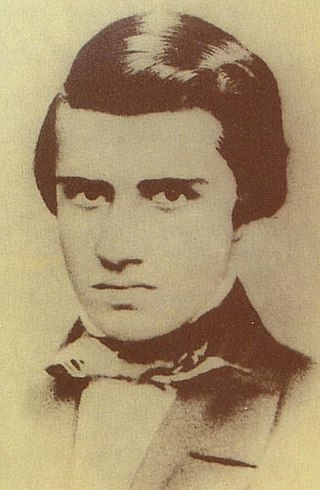
Frederick Charles Copleston was an English Roman Catholic Jesuit priest, philosopher, and historian of philosophy, best known for his influential multi-volume A History of Philosophy (1946–75).

Scholasticism was a medieval school of philosophy that employed a critical organic method of philosophical analysis predicated upon the Aristotelian 10 Categories. Christian scholasticism emerged within the monastic schools that translated scholastic Judeo-Islamic philosophies, and thereby "rediscovered" the collected works of Aristotle. Endeavoring to harmonize his metaphysics and its account of a prime mover with the Latin Catholic dogmatic trinitarian theology, these monastic schools became the basis of the earliest European medieval universities, contributing to the development of modern science; scholasticism dominated education in Europe from about 1100 to 1700. The rise of scholasticism was closely associated with these schools that flourished in Italy, France, Portugal, Spain and England.
Hylomorphism is a philosophical doctrine developed by the Ancient Greek philosopher Aristotle, which conceives every physical entity or being (ousia) as a compound of matter (potency) and immaterial form (act), with the generic form as immanently real within the individual. The word is a 19th-century term formed from the Greek words ὕλη and μορφή. Hylomorphic theories of physical entities have been undergoing a revival in contemporary philosophy.

Analytical Thomism is a philosophical movement which promotes the interchange of ideas between the thought of Thomas Aquinas, and modern analytic philosophy.

The Summa contra Gentiles is one of the best-known treatises by Thomas Aquinas, written as four books between 1259 and 1265.

Bernard Joseph Francis Lonergan was a Canadian Jesuit priest, philosopher, and theologian, regarded by many as one of the most important thinkers of the 20th century.

Thomas Cajetan, OP, also known as Gaetanus, commonly Tommaso de Vio or Thomas de Vio, was an Italian philosopher, theologian, the Master of the Order of Preachers 1508 to 1518, and cardinal from 1517 until his death. He was a leading theologian of his day who is now best known as the spokesman for Catholic opposition to the teachings of Martin Luther and the Protestant Reformation while he was the Pope's legate in Augsburg, and among Catholics for his extensive commentary on the Summa Theologica of Thomas Aquinas.

Paul of Venice was a Catholic philosopher, theologian, logician and metaphysician of the Order of Saint Augustine.

Manuel Antônio Álvares de Azevedo, affectionately called "Maneco" by his close friends, relatives and admirers, was a Brazilian Romantic poet, short story writer, playwright and essayist, considered to be one of the major exponents of Ultra-Romanticism and Gothic literature in Brazil. His works tend to play heavily with opposite notions, such as love and death, platonism and sarcasm, sentimentalism and pessimism, among others, and have a strong influence of Musset, Chateaubriand, Lamartine, Goethe and – above all – Byron.
Denys Alan Turner is an English philosopher and theologian. He is Horace Tracy Pitkin Professor of Historical Theology emeritus at Yale University having been appointed in 2005, previously having been Norris–Hulse Professor of Divinity at the University of Cambridge. He earned his Doctor of Philosophy degree in philosophy from the University of Oxford. He has written widely on political theory and social theory in relation to Christian theology, as well as on medieval thought, in particular, mystical theology and Christian mysticism.
The Nouvelle théologie is an intellectual movement in Catholic theology that arose in the mid-20th century. It is best known for Pope John XXIII's endorsement of its closely-associated ressourcement idea, which shaped the events of the Second Vatican Council. It existed most notably among certain circles of French and German theologians.

Neo-scholasticism is a revival and development of medieval scholasticism in Catholic theology and philosophy which began in the second half of the 19th century.

Brian Evan Anthony Davies is a British philosopher, Roman Catholic priest, and friar. He is Distinguished Professor of Philosophy, Fordham University, and author of An Introduction to the Philosophy of Religion, now in its fourth English edition, which has been translated into five languages.

Marie-Dominique Chenu was a Catholic theologian and one of the founders of the reformist journal Concilium.

Blackfriars Hall is a permanent private hall of the University of Oxford. Unlike a college, a Hall is owned and governed by an outside institution and not by its fellows. Although historically a centre for the study of theology and philosophy informed by the intellectual tradition of St Thomas Aquinas, it now admits men and women of any faith to a wide range of postgraduate degree programmes in the humanities and social sciences. The current Regent of Blackfriars is Fr. John O'Connor, O.P..

Thomas Aquinas was an Italian Dominican friar and priest, an influential philosopher and theologian, and a jurist in the tradition of scholasticism from the county of Aquino in the Kingdom of Sicily.

Augustinianism is the philosophical and theological system of Augustine of Hippo and its subsequent development by other thinkers, notably Boethius, Anselm of Canterbury and Bonaventure. Among Augustine's most important works are The City of God, De doctrina Christiana, and Confessions.
Analytic Theology (AT) refers to a growing body of primarily Christian theological literature resulting from the application of the methods and concepts of late-twentieth-century analytic philosophy.

The Cambridge Companion to Aquinas is a book edited by the American philosophers Norman Kretzmann and Eleonore Stump. A reference work, it features a number of writers who provides scholarly essays on the thoughts of the Italian Catholic philosopher and theologian Thomas Aquinas, collectively known as Thomism. The book was published on 28 May 1993 by Cambridge University Press. It received mixed responses from critics for being more focused to Aquinas' philosophy rather than his theology but has been deemed a valuable guide to the beginners by some.

The Quaestiones Disputatae de Veritate by Thomas Aquinas is a collection of questions that are discussed in the disputation style of medieval scholasticism. It covers a variety of topics centering on the true, the good and man's search for them, but the questions range widely from the definition of truth to divine providence, conscience, the good and free decision.













